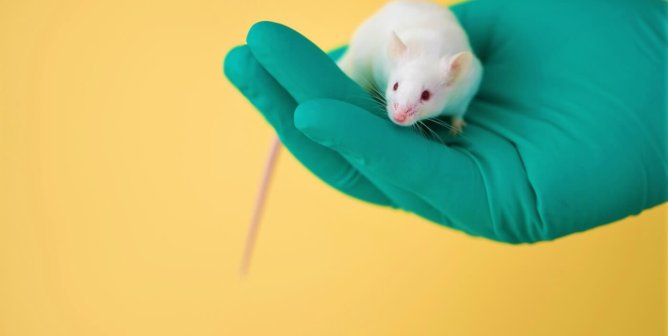Report Card Grades: Environmental Defense Fund
Report Card Grades » Environmental Defense Fund » Grade: C
PETA wrote to the Environmental Defense Fund (EDF) because it was one of the chief architects and is largely responsible for initiating the Environmental Protection Agency’s (EPA) notorious high production volume (HPV) chemical-testing program, which was created to pressure chemical manufacturers to test (or retest) thousands of chemicals using an arbitrary “checklist” of crude, painful, and uninformative animal tests. EDF’s comments on HPV chemical test plans frequently called for additional animal tests far beyond the testing proposed by the companies themselves or demanded by the EPA.
An example of EDF’s lobbying for animal tests is the case of the HPV chemical nadic methyl anhydride. Despite the fact that this chemical is already well documented to be highly toxic, corrosive, and blinding (and therefore already tightly controlled), EDF demanded that two additional animal tests be performed. One of these proposed tests (a 90-day oral toxicity study that is not even required in the HPV chemical program) would involve repeatedly poisoning animals for three months, while the other (a reproductive toxicity test) would cause the suffering and deaths of more than 900 animals. You can review EDF’s comments by clicking here and the comments of the animal-protection community by clicking here.
In addition, EDF requested that the American Chemistry Council (ACC) test the chemical-warfare agent phosgene on another 675 animals. This substance, which killed thousands of infantrymen during World War I, is so highly reactive that it converts to hydrochloric acid upon contact with moisture deep in the lungs and burns the respiratory tract. Despite the fact that even the EPA agreed with the ACC that no more animals need to die to test this chemical, EDF asked for reproductive/developmental studies of this lethal substance! Click here to read EDF’s comments.
EDF even “approved” and requested additional testing when companies submitted clearly unsatisfactory test plans consisting of a single sheet of paper with no data or information whatsoever. In fact, EDF went so far as to oppose PETA’s petition to the federal government that would have required companies to open their existing health and safety data files to the public.
Click here to read PETA’s original response to EDF’s letter to PETA members regarding the HPV program.
EDF officials on expert panels have testified that the maximum amount of animal testing should be undertaken regardless of the ineffectiveness of these tests. EDF set its sights on the growing field of nanotechnology, which includes industrial chemical testing as well as medical testing issues. The group somehow procured government funding to coauthor a scientifically outdated and highly questionable document that is basically a checklist of every conceivable animal test that EDF wants to be used to test nanomaterials.
When Nature published an article that called for a moratorium on some animal tests, EDF’s chief scientist fumed. The well-respected authors of the article recommended a pause in a massive European animal testing program known as REACH (Registration, Evaluation, and Authorization of Chemical Substances) so that non-animal alternatives for reproductive toxicity testing could be developed and incorporated. EDF argued against the partial animal testing moratorium, going so far as to state that “only” 2,600 animals would be killed for each reproductive toxicity test conducted, rather than the 3,200 suggested by the authors of the Nature article!
Despite PETA’s efforts—and the efforts of the thousands of PETA members who responded to our pleas to “defend animals from Environmental Defense”—EDF continues to push regulatory agencies to institute its massive animal testing plans.
EDF representatives are behind the times and so narrowly focused on animal testing that they have missed the boat entirely on the new era of modern non-animal testing methods.
As the U.S. government now recognizes and the Nature article states, high-capacity non-animal methods are the only possible way to test tens of thousands of chemicals. Continuing to depend on unreliable animal tests won’t result in the regulation of dangerous chemicals any more than it has up until now.
The Center for Media and Democracy also finds that EDF appears to have questionable motives and a pro-industry track record by explaining, “While [EDF] is a U.S.-based organization, it’s pushing for interim nanotechnology standards, developed with DuPont, to become a global template. . . . [W]e are entitled to view the nanotech partnership as just one more example of [EDF’s] misguided and potentially damaging opportunism.”
Update (June 2015)
EDF is supporting a bipartisan chemical-testing reform bill called the Frank R. Lautenberg Chemical Safety for the 21st Century Act, which would modernize the way chemicals are tested and regulated in the U.S. and encourage the use of cutting-edge non-animal test methods.



